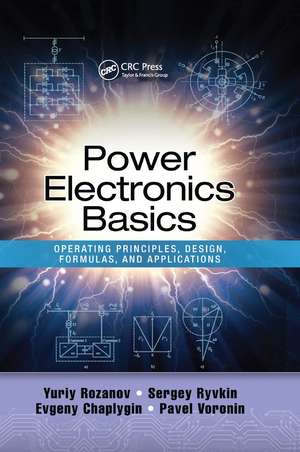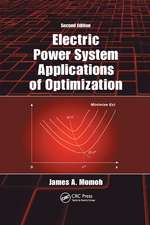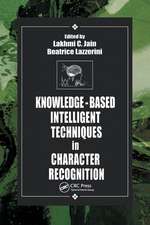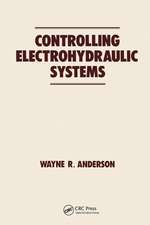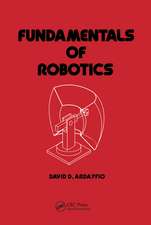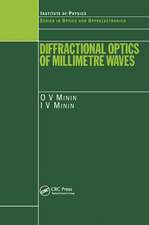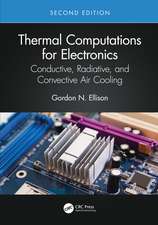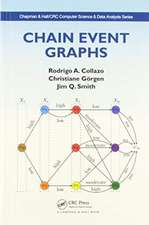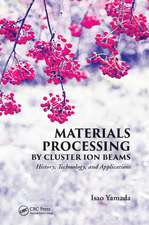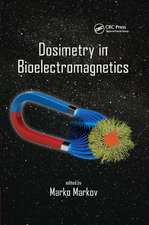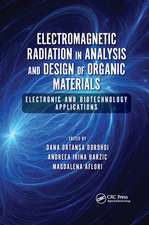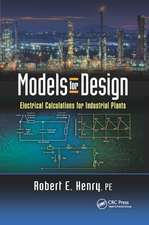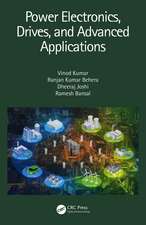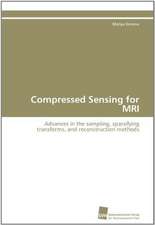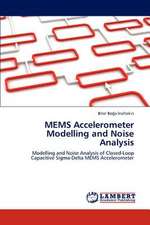Power Electronics Basics: Operating Principles, Design, Formulas, and Applications
Autor Yuriy Rozanov, Sergey E. Ryvkin, Evgeny Chaplygin, Pavel Voroninen Limba Engleză Paperback – 30 sep 2020
Power Electronics Basics: Operating Principles, Design, Formulas, and Applications provides fundamental knowledge for the analysis and design of modern power electronic devices. This concise and user-friendly resource:
- Explains the basic concepts and most important terms of power electronics
- Describes the power assemblies, control, and passive components of semiconductor power switches
- Covers the control of power electronic devices, from mathematical modeling to the analysis of the electrical processes
- Addresses pulse-width modulation, power quality control, and multilevel, modular, and multicell power converter topologies
- Discusses line-commutated and resonant converters, as well as inverters and AC converters based on completely controllable switches
- Explores cutting-edge applications of power electronics, including renewable energy production and storage, fuel cells, and electric drives
Power Electronics Basics: Operating Principles, Design, Formulas, and Applications supplies graduate students, industry professionals, researchers, and academics with a solid understanding of the underlying theory, while offering an overview of the latest achievements and development prospects in the power electronics industry.
| Toate formatele și edițiile | Preț | Express |
|---|---|---|
| Paperback (1) | 505.75 lei 43-57 zile | |
| CRC Press – 30 sep 2020 | 505.75 lei 43-57 zile | |
| Hardback (1) | 1123.37 lei 43-57 zile | |
| CRC Press – 23 apr 2015 | 1123.37 lei 43-57 zile |
Preț: 505.75 lei
Preț vechi: 595.00 lei
-15% Nou
Puncte Express: 759
Preț estimativ în valută:
96.81€ • 105.19$ • 81.37£
96.81€ • 105.19$ • 81.37£
Carte tipărită la comandă
Livrare economică 21 aprilie-05 mai
Preluare comenzi: 021 569.72.76
Specificații
ISBN-13: 9780367655976
ISBN-10: 0367655977
Pagini: 492
Dimensiuni: 156 x 234 x 38 mm
Greutate: 0.91 kg
Ediția:1
Editura: CRC Press
Colecția CRC Press
Locul publicării:Boca Raton, United States
ISBN-10: 0367655977
Pagini: 492
Dimensiuni: 156 x 234 x 38 mm
Greutate: 0.91 kg
Ediția:1
Editura: CRC Press
Colecția CRC Press
Locul publicării:Boca Raton, United States
Cuprins
Basic Concepts and Terms in Power Electronics. Semiconductor Power Switches and Passive Components. Control of Power Electronic Devices. Line-Commutated Converters. Conversion from Direct Current to Direct Current. Inverters and AC Converters Based on Completely Controllable Switches. Pulse-Width Modulation and Power Quality Control. Resonant Converters. Multilevel, Modular, and Multicell Converter Topologies. Applications of Power Electronics.
Notă biografică
Yuriy Rozanov earned a Dipl.-Eng in electromechanical engineering and Ph.D in science and technical science from the National Research University "Moscow Power Engineering Institute," Russia, where he is currently a professor in the Department of Electrical and Electronic Apparatus. Previously, Dr. Rozanov served as the head of the same department and worked in the electrical industry in various positions ranging from engineer to deputy chief designer. He has authored seven books and more than 160 articles and 24 patents, been awarded the prestigious title of Honored Scientist of the Russian Federation, and won the Government of the Russian Federation Award in the fields of science (2001) and education (2005). He is an IEEE fellow and a chairman of the IEEE Russian Chapter PEL/PES/IES/IAS, as well as editor-in-chief of Russian Electrical Engineering.
Sergey Ryvkin graduated with high honors as an engineer from the Moscow Aviation Institute (National Research University), earned his Ph.D from the Institute of Control Sciences of Russian Academy of Sciences (ICS RAS), Moscow, and was awarded a D.Sc from the Supreme Certifying Commission of the Russian Ministry of Education and Science, Moscow. He is currently a professor at the National Research University "Moscow Power Engineering Institute," Russia, and a main researcher at the ICS RAS. Dr. Ryvkin holds six patents and has published seven books and more than 130 technical papers. He is an IEEE senior member, full member of the Russian Academy of Electrotechnical Sciences and the Power Electronics and Motion Control Council, deputy editor-in-chief of Russian Electrical Engineering, and editorial board member of several international journals.
Evgeny Chaplygin graduated from the National Research University "Moscow Power Engineering Institute" (MPEI), Russia, and was awarded a Ph.D in power electronics. He is currently a professor in the Department of Industrial Electronics at MPEI, where he has supervised 11 students toward their master’s degrees. Dr. Chaplygin has patented 70 inventions and published three books and more than 100 papers. He is a member of the Academic Council of the Institute of Radio Electronics of MPEI and a member of the editorial board of the journal Russian Electrical Engineering. His areas of interest include modeling power electronic devices, improving energy-matter currency converters and mains, and increasing the quality of electricity through power electronics.
Pavel Voronin earned a Dipl.-Eng in electrical engineering and a Ph.D in power electronics from the National Research University "Moscow Power Engineering Institute," Russia, where he is currently an assistant professor in the Department of Industrial Electronics. He previously worked as an assistant in the same department. He has published more than 70 papers, two books, and 31 patents in the field of power electronics. His areas of interest include power converters, multilevel inverters, soft-switching circuits, and computer simulations of power electronic devices.
Sergey Ryvkin graduated with high honors as an engineer from the Moscow Aviation Institute (National Research University), earned his Ph.D from the Institute of Control Sciences of Russian Academy of Sciences (ICS RAS), Moscow, and was awarded a D.Sc from the Supreme Certifying Commission of the Russian Ministry of Education and Science, Moscow. He is currently a professor at the National Research University "Moscow Power Engineering Institute," Russia, and a main researcher at the ICS RAS. Dr. Ryvkin holds six patents and has published seven books and more than 130 technical papers. He is an IEEE senior member, full member of the Russian Academy of Electrotechnical Sciences and the Power Electronics and Motion Control Council, deputy editor-in-chief of Russian Electrical Engineering, and editorial board member of several international journals.
Evgeny Chaplygin graduated from the National Research University "Moscow Power Engineering Institute" (MPEI), Russia, and was awarded a Ph.D in power electronics. He is currently a professor in the Department of Industrial Electronics at MPEI, where he has supervised 11 students toward their master’s degrees. Dr. Chaplygin has patented 70 inventions and published three books and more than 100 papers. He is a member of the Academic Council of the Institute of Radio Electronics of MPEI and a member of the editorial board of the journal Russian Electrical Engineering. His areas of interest include modeling power electronic devices, improving energy-matter currency converters and mains, and increasing the quality of electricity through power electronics.
Pavel Voronin earned a Dipl.-Eng in electrical engineering and a Ph.D in power electronics from the National Research University "Moscow Power Engineering Institute," Russia, where he is currently an assistant professor in the Department of Industrial Electronics. He previously worked as an assistant in the same department. He has published more than 70 papers, two books, and 31 patents in the field of power electronics. His areas of interest include power converters, multilevel inverters, soft-switching circuits, and computer simulations of power electronic devices.
Recenzii
"... valuable to every undergraduate or graduate student, practicing engineer or technician, industry professional, researcher, and academic willing to study the broad field of power electronics. It offers a solid background on the underlying theory, while making an overview about the latest trends in converters and control methods of the power electronics industry. The book is also fundamental for power electronics professors and instructors, serving as a textbook for undergraduate classes and as a model for more advanced courses."
—Fernando A. Silva, Instituto Superior Técnico, Universidade de Lisboa, Portugal, from IEEE Industrial Electronics Magazine, December 2015
"... a very good manual for engineers and researchers, in which they can find the basic features of power electronics and its advantages and disadvantages. ... very useful. ... imparts readers with the basic knowledge needed for full use of the potential of power electronics. ... The authors are qualified experts in the field. ... This clear, integrated presentation that calls attention to the main features of power electronics may serve as a good tool in power electronics instruction."
—Vadim Utkin, IEEE Fellow and Professor, Ohio State University, Columbus, USA, from Russian Electrical Engineering, 2015
"… a great handbook of power electronics. It contains a deeply comprehensive and up-to-date overview of both the building blocks and the converter topologies. The book is unique in linking its main power electronics part to particular control methods as well as to particular applications. This approach helps anybody not directly experienced in this field to understand power electronics in the context of its typical use. The control engineers then can better understand specialties and limitation of particular control methods regarding power switches. Finally, for university students, this book also shall be a signpost referring additional topics that cannot be the subject of ordinary instruction for time reasons, and it shall convey to students the overall picture."
—Stanislav Flígl, Czech Technical University in Prague, Czech Republic
"Readers will understand the logical configuration of power electronics … because the basic theory is explained in detail, and then performances of converters and inverters are shown based on this basic knowledge."
—Fujio Kurokawa, Nagasaki University, Japan
"…All aspects related with Power Electronics are presented in a concise and succinct way by covering a broad region of topics of this interdisciplinary subject , which results of the intersection of Circuit and Control Theory , with Power Semiconductor Devices and Magnetics … the strength of the book lies in its synthesis capacity to describe the main characteristics of power semiconductors and control techniques."
—Luis Martinez-Salamero, Rovira i Virgili University, Spain
—Fernando A. Silva, Instituto Superior Técnico, Universidade de Lisboa, Portugal, from IEEE Industrial Electronics Magazine, December 2015
"... a very good manual for engineers and researchers, in which they can find the basic features of power electronics and its advantages and disadvantages. ... very useful. ... imparts readers with the basic knowledge needed for full use of the potential of power electronics. ... The authors are qualified experts in the field. ... This clear, integrated presentation that calls attention to the main features of power electronics may serve as a good tool in power electronics instruction."
—Vadim Utkin, IEEE Fellow and Professor, Ohio State University, Columbus, USA, from Russian Electrical Engineering, 2015
"… a great handbook of power electronics. It contains a deeply comprehensive and up-to-date overview of both the building blocks and the converter topologies. The book is unique in linking its main power electronics part to particular control methods as well as to particular applications. This approach helps anybody not directly experienced in this field to understand power electronics in the context of its typical use. The control engineers then can better understand specialties and limitation of particular control methods regarding power switches. Finally, for university students, this book also shall be a signpost referring additional topics that cannot be the subject of ordinary instruction for time reasons, and it shall convey to students the overall picture."
—Stanislav Flígl, Czech Technical University in Prague, Czech Republic
"Readers will understand the logical configuration of power electronics … because the basic theory is explained in detail, and then performances of converters and inverters are shown based on this basic knowledge."
—Fujio Kurokawa, Nagasaki University, Japan
"…All aspects related with Power Electronics are presented in a concise and succinct way by covering a broad region of topics of this interdisciplinary subject , which results of the intersection of Circuit and Control Theory , with Power Semiconductor Devices and Magnetics … the strength of the book lies in its synthesis capacity to describe the main characteristics of power semiconductors and control techniques."
—Luis Martinez-Salamero, Rovira i Virgili University, Spain
Descriere
This book explains the key concepts and terms of power electronics, exploring applications including renewable energy production, fuel cells, and electric drives. It describes the power assemblies, control, and passive components of semiconductor power switches. It covers the control of power electronic devices, from mathematical modeling
